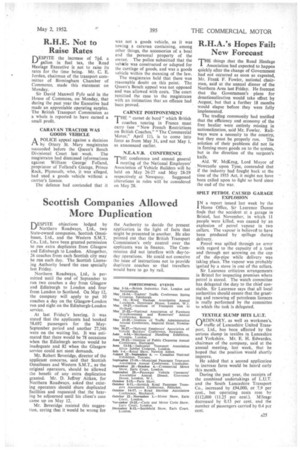SPILT PETROL CAUSED GARAGE EXPLOSION
Page 27

If you've noticed an error in this article please click here to report it so we can fix it.
I N a report issued last week by the Home Office, Sir Laurence Dunne finds that the accident at a garage in Bristol, last November, in which II people were killed, was caused by an explosion of petrol vapour in two cellars. The vapour is believed to have been produced by spillage during delivery.
Petrol was spilled through an error with regard to the capacity of a tank and through not screwing on the cap of the dip-pipe while delivery was taking place. The vapour was probably ignited by a stove in one of the cellars.
Sir Laurence criticizes arrangements in Bristol for inspecting premises where petrol is stored. The watch committee has delegated the duty to the chief constable. Sir Laurence says that all local authorities should ensure that the granting and renewing of petroleum licences is really performed by the committee to which the task is delegated.
TEXTILE SLUMP HITS L.U.T.
QRDINARY, as well as workmen's, traffic of Lancashire United Transport, Ltd., has been affected by the serious slump in textiles in Lancashire and Yorkshire. Mr. E. H. Edwardes, chairman of the company, said at the annual meeting, last week, that he hoped that the position would shortly improve.
He added that a second application to increase fares would be heard early this month.
During the past year, the receipts of the combined undertakings of L.U.T. and the South Lancashire Transport Co., increased by £94,000, or 7.9 per cent., but operating costs rose by £112,000 (11.25 per cent.). Mileage decreased by 0.13 per cent. and the number of passengers carried by 0.4 per cent.




















































































